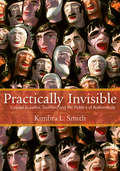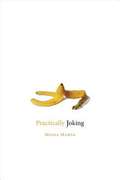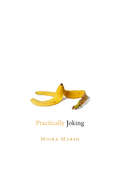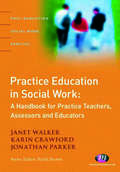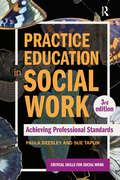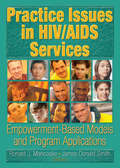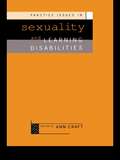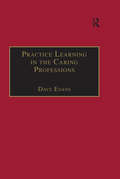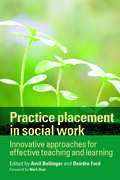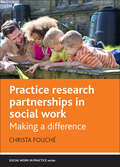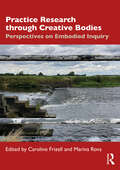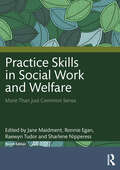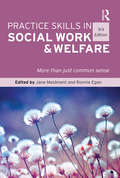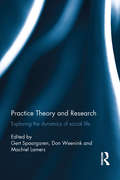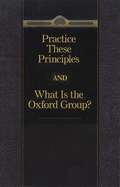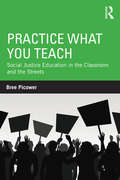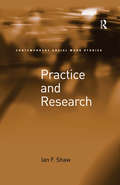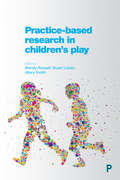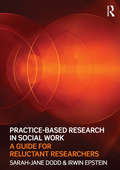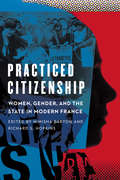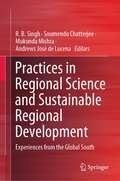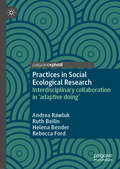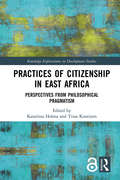- Table View
- List View
Practically Invisible: Coastal Ecuador, Tourism, and the Politics of Authenticity
by Kimbra Smith<p>The community of Agua Blanca, deep within the Machalilla National Park on the coast of Ecuador, found itself facing the twenty-first century with a choice: embrace a booming tourist industry eager to experience a preconceived notion of indigeneity, or risk losing a battle against the encroaching forces of capitalism and development. The facts spoke for themselves, however, as tourism dollars became the most significant source of income in the community. <p>Thus came a nearly inevitable shock, as the daily rhythms of life--rising before dawn to prepare for a long day of maintaining livestock and crops; returning for a late lunch and siesta; joining in a game of soccer followed by dinner in the evening--transformed forever in favor of a new tourist industry and the compromises required to support it. As <i>Practically Invisible</i> demonstrates, for Agua Blancans, becoming a supposedly "authentic" version of their own indigenous selves required performing their culture for outsiders, thus becoming these performances within the minds of these visitors. <p>At the heart of this story, then, is a delicate balancing act between tradition and survival, a performance experienced by countless indigenous groups.</p>
Practically Invisible: Coastal Ecuador, Tourism, and the Politics of Authenticity
by Kimbra SmithThe community of Agua Blanca, deep within the Machalilla National Park on the coast of Ecuador, found itself facing the twenty-first century with a choice: embrace a booming tourist industry eager to experience a preconceived notion of indigeneity, or risk losing a battle against the encroaching forces of capitalism and development. The facts spoke for themselves, however, as tourism dollars became the most significant source of income in the community. Thus came a nearly inevitable shock, as the daily rhythms of life--rising before dawn to prepare for a long day of maintaining livestock and crops; returning for a late lunch and siesta; joining in a game of soccer followed by dinner in the evening--transformed forever in favor of a new tourist industry and the compromises required to support it. As Practically Invisible demonstrates, for Agua Blancans, becoming a supposedly "authentic" version of their own indigenous selves required performing their culture for outsiders, thus becoming these performances within the minds of these visitors. At the heart of this story, then, is a delicate balancing act between tradition and survival, a performance experienced by countless indigenous groups.
Practically Joking
by Moira MarshIn Practically Joking, the first full-length study of the practical joke, Moira Marsh examines the value, artistry, and social significance of this ancient and pervasive form of vernacular expression.Though they are sometimes dismissed as the lowest form of humor, practical jokes come from a lively tradition of expressive play. They can reveal both sophistication and intellectual satisfaction, with the best demanding significant skill and talent not only to conceive but also to execute. Practically Joking establishes the practical joke as a folk art form subject to critical evaluation by both practitioners and audiences, operating under the guidance of local aesthetic and ethical canons. Marsh studies the range of genres that pranks comprise; offers a theoretical look at the reception of practical jokes based on "benign transgression"--a theory that sees humor as playful violation--and uses real-life examples of practical jokes in context to establish the form's varieties and meanings as an independent genre, as well as its inextricable relationship with a range of folklore forms. Scholars of folklore, humor, and popular culture will find much of interest in Practically Joking.
Practically Joking
by Moira MarshIn Practically Joking, the first full-length study of the practical joke, Moira Marsh examines the value, artistry, and social significance of this ancient and pervasive form of vernacular expression. Though they are sometimes dismissed as the lowest form of humor, practical jokes come from a lively tradition of expressive play. They can reveal both sophistication and intellectual satisfaction, with the best demanding significant skill and talent not only to conceive but also to execute. Practically Joking establishes the practical joke as a folk art form subject to critical evaluation by both practitioners and audiences, operating under the guidance of local aesthetic and ethical canons. Marsh studies the range of genres that pranks comprise; offers a theoretical look at the reception of practical jokes based on “benign transgression”—a theory that sees humor as playful violation—and uses real-life examples of practical jokes in context to establish the form’s varieties and meanings as an independent genre, as well as its inextricable relationship with a range of folklore forms. Scholars of folklore, humor, and popular culture will find much of interest in Practically Joking.
Practice Education in Social Work: A Handbook for Practice Teachers, Assessors and Educators (Post-Qualifying Social Work Practice Series)
by Jonathan Parker Karin Crawford Janet WalkerWritten specifically for practice educators, this book examines contemporary theories and knowledge in practice learning, teaching and education, with a clear emphasis on developing the skills and practice of the individual. Another key focus of the book is to help readers to reflect on the implications of this for their role as practice educators, giving them the time and space to make proactive and informed choices. The book is structured around the new Post-Qualifying Standards for Practice Education, making it an invaluable and thoroughly comprehensive guide.
Practice Education in Social Work: Achieving Professional Standards (Critical Skills for Social Work)
by Sue Taplin Paula BeesleyThis best-selling book is an invaluable guide for social workers undertaking learning and assessment to gain and maintain Stage 1 or 2 qualified practice educator status and for those involved in facilitating the mentoring, learning, support, assessment and CPD of practice educators.Now fully updated to reflect the changing social work placement landscape and the BASW refreshed (2022) Practice Educator Professional Standards (PEPS), it covers all key areas within Practice Educator training and offers guidance on the application of key skills and knowledge in supporting, assessing and teaching social work students and managing the placement. It will particularly assist Practice Educators to: Understand, prepare for and provide appropriate learning opportunities Supervise and develop social work students effectively Understand holistic assessment of practice; assessing in line with capability levels expected at the end of first and final placement Deal with weaker or failing students Prepare for the PEPS qualification process.
Practice Issues in HIV/AIDS Services: Empowerment-Based Models and Program Applications
by James D Smith R Dennis Shelby Ronald J MancoskeImprove quality of life for patients with HIV/AIDS! Practice Issues in HIV/AIDS Services: Empowerment-Based Models and Program Applications provides a sound framework of intervention practices for case managers and care coordinators to help HIV/AIDS patients live longer and healthier lives. This book focuses on client-based care that addre
Practice Issues in Sexuality and Learning Disabilities
by Ann CraftPractice Issues in Sexuality and Learning Disabilities explores the sexual behaviour of people with learning difficulties and addresses issues of concern such as sexual abuse, HIV and AIDS, service provision for those from ethnic minorities, the development of policy guidelines and the implementation of such guidelines in this intensely personal area. Ann Craft draws upon professional expertise from a broad range of backgrounds including social work, psychology, and medicine. She offers practical ideas and suggestions for service responses which acknowledge and respect the right of people with learning disabilities to express their sexuality in ways that are valued by other members of their society. Practice Issues in Sexuality and Learning Disabilities will be of interest to all whose work or relationship brings them into contact with people with learning disabilities - professionals, carers, parents, advocates. It will be invaluable to social workers, practitioners in social work and health, trainees, training officers and voluntary organizations.
Practice Learning in the Caring Professions
by Dave EvansDave Evans makes a convincing case that practice learning occupies a central role in the education and training of the caring professions. In doing so, he affirms the activities of many service agency staff involved in practice teaching and assessment and offers them clear models and illustrative examples to aid their development. He also explores ways in which practice learning and assessment can be effectively developed in academic settings.
Practice Placement in Social Work: Innovative Approaches for Effective Teaching and Learning
by Avril Bellinger and Deirdre FordInvolved in educating social work professionals? Overwhelmed and demoralised by the current climate of cuts to services and over-regulation? This unique book written by practice educators, students and academics offers hope. This collection of innovative approaches to social work placements addresses subjects including sustainability, student-led services, overseas placements, the value of the third-sector, supporting students from minority groups and the visual arts. The international and diverse contributions offer practical guidance and challenge conventional approaches to placement finding, teaching and assessment in field education. Written from a global social work perspective this is essential reading for anyone responsible for ensuring quality placements for future professionals.
Practice Research Partnerships in Social Work: Making a Difference (Social Work in Practice series)
by Christa FouchéPractice research partnerships in social work can make a significant difference to social work service delivery. This comprehensive, accessibly written resource, is designed to help students and practitioners to actively engage with research through their frontline work. Through clear practice scenarios, critical questions and examples from research the text guides researchers, students, educators, practice managers, funders and practitioners to creatively explore partnerships in creating, contributing, consuming, commissioning or critiquing evidence in and for social work practice. The text encourages collaborative practice by demonstrating the transformative nature of knowledge networks to ‘make a difference’ in social work practice. An essential text for students undertaking professional training at all levels as well as meeting the needs of qualified staff for continued professional development.
Practice Research through Creative Bodies: Perspectives on Embodied Inquiry
by Marina Rova Caroline FrizellThis anthology brings a focus to practice research in which moving bodies and creative processes are imperatives. It brings together a diverse range of researchers and performers who present innovative research through single authored and co-authored projects that trouble the notion that there are limited ways of researching and performing.As the anthology unfolds, readers are invited to consider the many different ways in which (em)bodied research and performance generates new knowledge; that is new ways of seeing the world. The approaches include phenomenology, new materialism, posthumanism, arts-based research, autoethnography, case study and ecofeminist methodologies. The wide range of methodologies performed in the book illustrate the multiple (infinite) possibilities of practice research, each of which are uniquely situated within personal, professional, spacio-temporal and socio-political contexts that enable inquiry to emerge and submerge as responsive processes. The contributors represent a wide representation from mother-artists, to psychoanalytic practitioners, to community dance artists, to performers, to somatic therapists to arts psychotherapists. Their research and performance includes non-stylised movement, improvisational dance and dance as participation in the world.This book democratises the idea that creative moving bodies are a practice research resource that can enable each of us to become part of the wider world. It is a useful resource for students, researchers and professionals in art therapies, somatic practice and arts performance.
Practice Skills in Social Work and Welfare: More Than Just Common Sense
by Jane Maidment Sharlene Nipperess Ronnie Egan Raewyn TudorPractice Skills in Social Work and Welfare has established itself as the essential text to prepare students for the wide-ranging challenges they will face in today's human service sector. This new fourth edition continues the text's core strength of connecting theory with practical examples to build the reader's confidence and expertise in key areas of practice. Part 1 outlines the critical social work and strengths-based practices that underpin the book's approach and provides the context for learning practice skills in a group setting, during community development projects and with individuals and families. Part 2 focuses on developing effective relationships with service users, illustrating through realistic scenarios how social work and human service practitioners can apply their practice skills in a range of settings. In Part 3, the essential elements of client assessment are explored, including risk assessment and cross-cultural perspectives. Issues surrounding intervention are examined in Part 4 from working with families and groups to challenging constructively and safely, while research, evaluation and facilitating closure are covered in the final part. This fourth edition is fully revised and updated and features new material on working with technology, Pasifika communities, LGBTQI+ service users and culturally responsive practice.
Practice Skills in Social Work and Welfare: More than just common sense
by Jane Maidment Ronnie EganPractice Skills in Social Work and Welfare has established itself as the essential text to prepare students for the wide-ranging challenges they will face in today's human service sector. This new third edition continues the text's core strength of combining grounded theory with practical examples to build the reader's confidence and expertise in key areas of practice.Part I outlines the anti-oppressive and strengths-based practices that underpin the book's approach and provides the context for learning practice skills in a group setting, during community development projects and with individuals. Part II focuses on developing effective relationships with clients, illustrating through realistic scenarios how social work and human service workers can apply their practice skills in a range of settings. In Part III the essential elements of client assessment are explored, including risk assessment and cross-cultural perspectives. Issues surrounding intervention are examined in Part IV from working with families and groups to challenging constructively and safely, while research, evaluation and facilitating closure are covered in the final part.This third edition is fully revised and updated, and features new material on using information technology, working with Indigenous Aboriginal and Torres Strait Islander peoples and Maori, and engaging with families in the statutory system.'The main strength of the book is the consistency of its themes throughout the text.' - Karen Heycox in Australian Social Work
Practice Theory and Research: Exploring the dynamics of social life
by Gert Spaargaren, Don Weenink and Machiel LamersThere has been an upsurge in scholarship concerned with theories of social practices in various fields including sociology, geography and management studies. This book provides a systematic introduction and overview of recent formulations of practice theory organised around three important themes: the importance of analysing the role of the non-human alongside the human; the reflexive nature of social science research; and the dynamics of social change. Combining a rich variety of detailed empirical research examples with discussion of the relevance of practice theories for policy and social change, this book represents an excellent sourcebook for all academic and professional researchers interested in working with practice theory.
Practice These Principles And What Is The Oxford Group
by AnonymousPractice These Principles is an edited, up-to-date version of What is the Oxford Group?, a core book for early AA which is also printed in this two-book volume.Those interested in A.A. history will find this two-book volume to be a must-have edition. Practice These Principles is an edited version of the original work, What is the Oxford Group? (full text reprinted) which served as a basis for the text of Alcoholics Anonymous. What is the Oxford Group? was written in 1932 and served as one of the core books for early A.A.s.
Practice What You Teach: Social Justice Education in the Classroom and the Streets (Teaching/Learning Social Justice)
by Bree Picower<p>Many teachers enter the profession with a desire to "make a difference." But given who most teachers are, where they come from, and what pressure they feel to comply with existing school policies, how can they take up this charge? Practice What You Teach follows three different groups of educators to explore the challenges of developing and supporting teachers’ sense of social justice and activism at various stages of their careers: White pre-service teachers typically enrolled in most teacher education programs, a group of new teachers attempting to integrate social justice into their teaching, and experienced educators who see their teaching and activism as inextricably linked. Teacher educator Bree Picower delves into each of these group’s triumphs and challenges, providing strategies and suggestions for all teachers along with her in-depth analysis. <p>By understanding all these challenges, pre-service and in-service teachers, along with teacher educators, will be in a better position to develop the kind of political analysis that lays the foundation for teacher activism. This timely resource helps prepare and support all educators to stand up for equity and justice both inside and outside of the classroom and offers a more nuanced portrait of what the struggle to truly "make a difference" looks like.</p>
Practice and Research (Contemporary Social Work Studies)
by Ian F. ShawPractice and Research is an overview of Professor Ian Shaw's analysis of the complexity and challenges of the practice/research relationship in social work - a theme that has been the focus of much of his writing over his career. Introduced with a new essay that reflects on the 'serendipity, misfires and occasional patterns' in his work, the book is grouped into five sections. It covers the following themes, each of which is fully contextualized: ¢ Perspectives on Social Work Research ¢ Evaluation ¢ Qualitative Social Work Research ¢ Practice and Research ¢ The Receiving End: Service Users and Research This book has much to say about the relationship between social work practice and research and is a must-read for any social work student or practitioner.
Practice of Everyday Life: Volume 2: Living and Cooking
by Michel De CerteauTo remain unconsumed by consumer society—this was the goal, pursued through a world of subtle and practical means, that beckoned throughout the first volume of The Practice of Everyday Life. The second volume of the work delves even deeper than did the first into the subtle tactics of resistance and private practices that make living a subversive art. Michel de Certeau, Luce Giard, and Pierre Mayol develop a social history of “making do” based on microhistories that move from the private sphere (of dwelling, cooking, and homemaking) to the public (the experience of living in a neighborhood). A series of interviews—mostly with women—allows us to follow the subjects’ individual routines, composed of the habits, constraints, and inventive strategies by which the speakers negotiate daily life. Through these accounts the speakers, “ordinary” people all, are revealed to be anything but passive consumers. Amid these experiences and voices, the ephemeral inventions of the “obscure heroes” of the everyday, we watch the art of making do become the art of living.This long-awaited second volume of de Certeau’s masterwork, updated and revised in this first English edition, completes the picture begun in volume 1, drawing to the last detail the collective practices that define the texture, substance, and importance of the everyday.Michel de Certeau (1925-1986) wrote numerous books that have been translated into English, including Heterologies (1986), The Capture of Speech (1998), and Culture in the Plural (1998), all published by Minnesota. Luce Giard is senior researcher at the Centre National de la Recherche Scientifique and is affiliated with the Ecole des Hautes Etudes en Sciences Sociales, Paris. She is visiting professor of history and history of science at the University of California, San Diego. Pierre Mayol is a researcher in the French Ministry of Culture in Paris.Timothy J. Tomasik is a freelance translator pursuing a Ph.D. in French literature at Harvard University.
Practice-Based Research in Children's Play
by Wendy Russell, Stuart Lester and Hilary SmithThis unique collection of 12 research projects carried out by experienced practitioners in the play sector in the UK and USA puts forward a range of perspectives on children's play and adults' relationships with it. Drawing on a diverse range of research methodologies, the studies consider adults' memories of play; the co-production of spaces where children can play (in adventure playgrounds, out of school clubs, children’s zoos, children's museums and public space); therapeutic approaches to playwork; playwork and wellbeing; supporting the play of severely disabled children and young people; play and contemporary art practice; and children's use of technology in a playground. Offering a fresh look beyond the dominant singular voice of developmental psychology, this book is essential reading for anyone studying or working with children at play.
Practice-Based Research in Social Work: A Guide for Reluctant Researchers
by Irwin Epstein Sarah-Jane DoddThis unique textbook explores practice-based research (PBR), using numerous practice examples to actively encourage and engage students and practitioners to embrace research as a meaningful support for their practice. Whilst evidence-based practice gives practitioners access to information about "universal" best practices, it does not prioritize practitioner-generated knowledge or promote new research-based interventions relevant to their own practice circumstances as PBR does. This book discusses the evolution of PBR as a distinct social work research approach, describes its principles and methods and presents a range of exemplars illustrating the application of PBR within different practice methods in different practice settings. The chapters cover: Identifying the research question in a PBR model Designing a study and identifying a methodology Sampling Literature reviews Gathering data Ethics Analyzing data and interpreting results Putting research into practice Viewing the practitioner as central to the research process, and research as a necessary component of practice, this invaluable book emphasizes the seamless integration of practice and research. It is about research in social work practice rather than research on social work practice. Each chapter includes an overview, an introduction, and a key concepts summary. Practice-Based Research in Social Work is a very accessible text suitable for social work students, particularly MSW students, and practitioners.
Practiced Citizenship: Women, Gender, and the State in Modern France
by Richard S. Hopkins Nimisha BartonOver fifty years ago sociologist T. H. Marshall first opened the modern debate about the evolution of full citizenship in modern nation-states, arguing that it proceeded in three stages: from civil rights, to political rights, and finally to social rights. The shortcomings of this model were clear to feminist scholars. As political theorist Carol Pateman argued, the modern social contract undergirding nation-states was from the start premised on an implicit “sexual contract.” According to Pateman, the birth of modern democracy necessarily resulted in the political erasure of women. Since the 1990s feminist historians have realized that Marshall’s typology failed to describe adequately developments that affected women in France. An examination of the role of women and gender in welfare-state development suggested that social rights rooted in republican notions of womanhood came early and fast for women in France even while political and economic rights would continue to lag behind. While their considerable access to social citizenship privileges shaped their prospects, the absence of women’s formal rights still dominates the conversation. Practiced Citizenship offers a significant rereading of that narrative. Through an analysis of how citizenship was lived, practiced, and deployed by women in France in the modern period, Practiced Citizenship demonstrates how gender normativity and the resulting constraints placed on women nevertheless created opportunities for a renegotiation of the social and sexual contract.
Practices in Regional Science and Sustainable Regional Development: Experiences from the Global South
by Soumendu Chatterjee R. B. Singh Mukunda Mishra Andrews José de LucenaThis book brings together the emerging trends and techniques incorporated in regional science during the first two decades of this millennium. The book includes systematic and analytical notes making scientific commentary on the innovative methods of regional development, measurement of the development, regional development models, and policy measures that have significant implications and wide applicability instrumental for India as well as the other global south countries. There is clear evidence in the global south of the uneven spatial distribution of resources, economic activities, literacy, and health conditions. The most striking fact is the coexistence of development and underdevelopment that makes the planning process complicated. This can hardly be explored without taking a deep insight into the matter of how the regional parameters are impacting regional society or economy to shape the development of that region. There can be no effective global policy framework that will be effective equally for each and every region to mitigate local issues of society or economy. It is here that the book integrates the efforts of practitioners working towards addressing these regional issues and striving for sustainable regional development through their innovative ideas.Through its contributions, the book addresses development issues, regional impact of climate change, social justice, migration, well-being, livelihood vulnerabilities, and regional urban-environmental issues from the standpoint of regional science. It is a significant resource for researchers of spatial science, and policy makers.
Practices in Social Ecological Research: Interdisciplinary collaboration in 'adaptive doing'
by Helena Bender Andrea Rawluk Ruth Beilin Rebecca FordAimed at those at the forefront of social ecological thinking, this book presents a practice-oriented process to navigate the complex, interdisciplinary challenges of our time. The book brings together insights from the social sciences and beyond to introduce readers to ‘adaptive doing’ - a continuous and iterative process of experiential learning that provides an accessible structure and process for integrating a range of knowledge and practices. As part of the ‘adaptive doing’ learning cycle, the authors argue for a common platform, symbolically called ‘the agora’, where multiple ways of understanding can be discussed. In this space, participants can work from practice and narratives, toward meaning, knowledge formation and practice change.The book demonstrates three reframing tools for social ecological practice that provide readers with multiple ways of holistically entering the social ecological domain and expanding their perspectives with a view to changing practice. ‘Adaptive doing’ is presented as a catalyst for a new generation of social ecological research, in which participants honour their disciplinary foundations while being ready to collaborate within each new system, and each new engagement: being able to act now, for social ecological recognition and change.
Practices of Citizenship in East Africa: Perspectives from Philosophical Pragmatism (Routledge Explorations in Development Studies)
by Tiina Kontinen Katariina HolmaPractices of Citizenship in East Africa uses insights from philosophical pragmatism to explore how to strengthen citizenship within developing countries. Using a bottom-up approach, the book investigates the various everyday practices in which citizenship habits are formed and reformulated. In particular, the book reflects on the challenges of implementing the ideals of transformative and critical learning in the attempts to promote active citizenship. Drawing on extensive empirical research from rural Uganda and Tanzania and bringing forward the voices of African researchers and academics, the book highlights the importance of context in defining how habits and practices of citizenship are constructed and understood within communities. The book demonstrates how conceptualizations derived from philosophical pragmatism facilitate identification of the dynamics of incremental change in citizenship. It also provides a definition of learning as reformulation of habits, which helps to understand the difficulties in promoting change. This book will be of interest to scholars within the fields of development, governance, and educational philosophy. Practitioners and policy-makers working on inclusive citizenship and interventions to strengthen civil society will also find the concepts explored in this book useful to their work.
